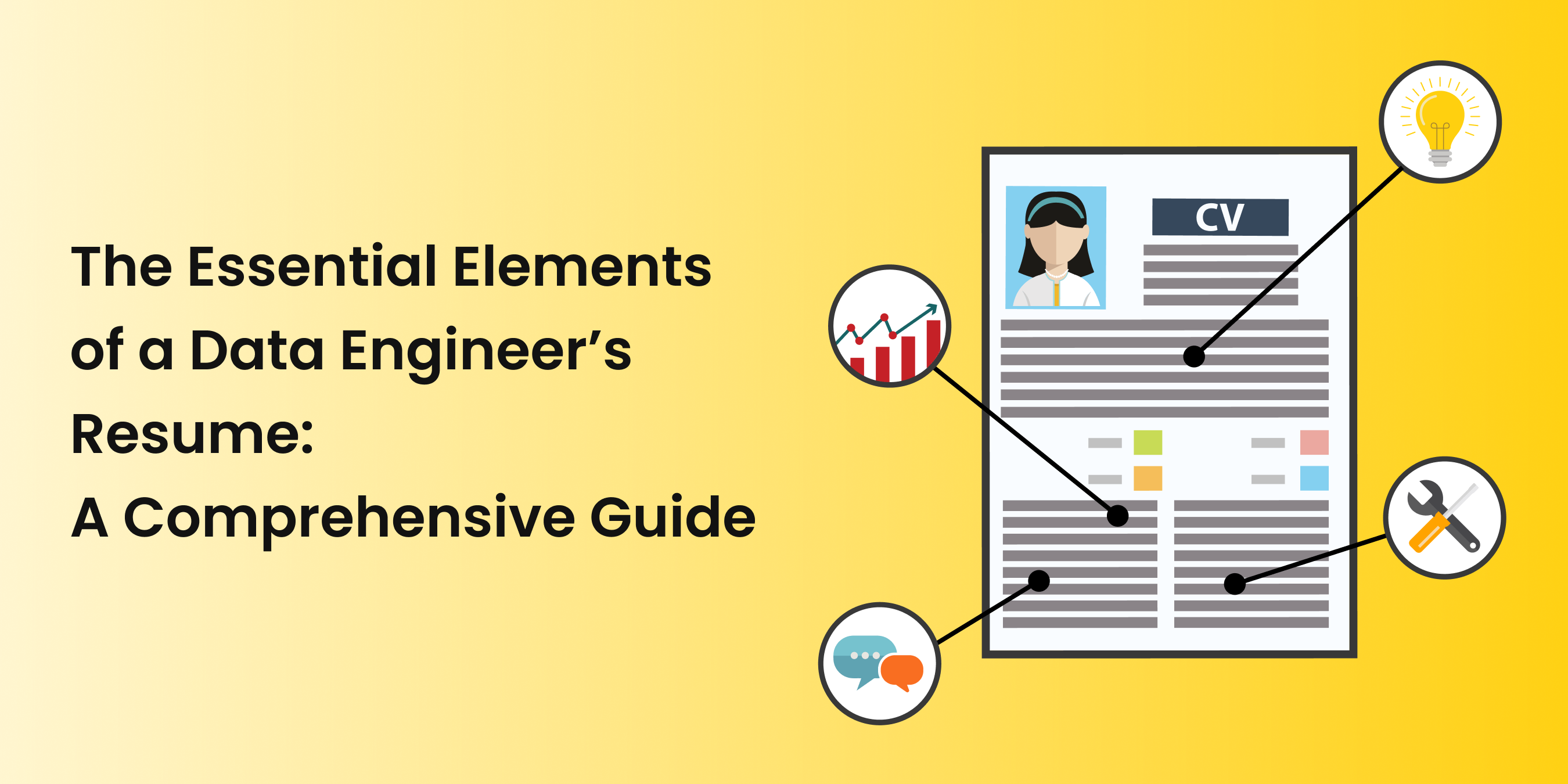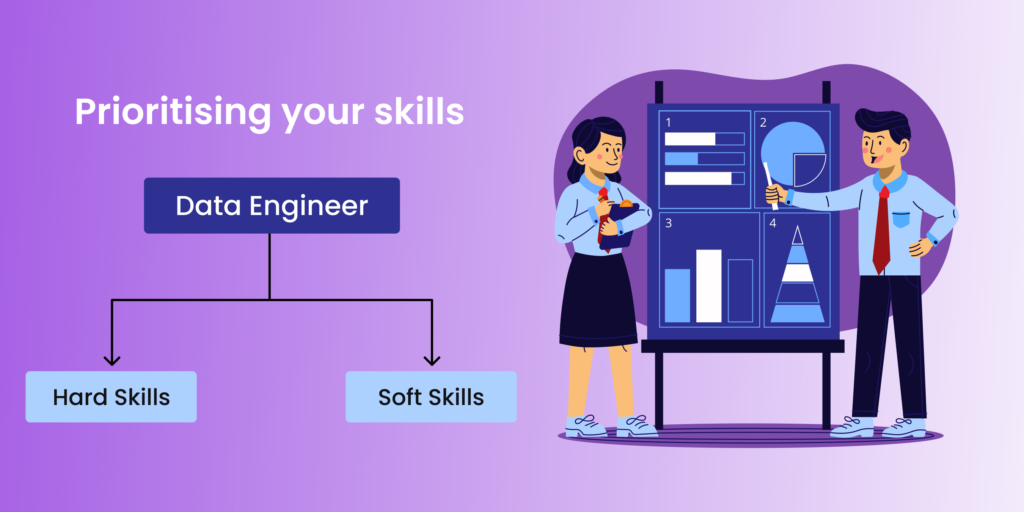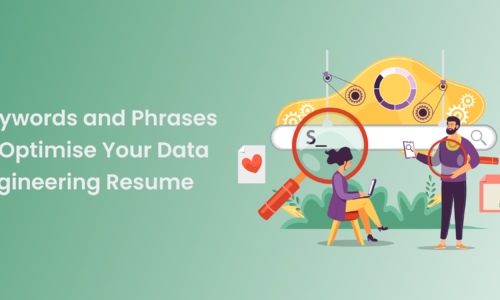
How to make a Data Engineer’s Resume – Key Elements & Skills
- ScholarNest
- October 25, 2023
- Data Engineering Resume, Resume Writing
The Essential Elements of a Data Engineer’s Resume: A Comprehensive Guide
Stressing about how to create a data engineer’s resume? Read this comprehensive guide to curate a mindblowing resume before you proceed to apply for your next job.
The role of a data engineer has evolved greatly with time. It’s not just limited to collection, organisation and processing of data.It now demands different deals of specialisation. This implies that your resume has to be specialised as well.You must know the key details which the employers are looking for.
1. Understanding and choosing the right format
Before you set sail to write your impressive resume, you must know the different formats being used currently.
- Functional Format
- Reverse Chronological Format
- Hybrid Format
If you’re a beginner or a student with minimal experience, functional format would be the best choice for your resume. This format mainly focuses on your skills rather than your work experience. It would be best to highlight your skills right at the beginning of your resume to attract the employer’s attention.
Most of the hiring managers are interested in knowing whether you’re switching your job to enhance your skills or just changing from one company to another. Reverse chronological format becomes the best choice for such cases. This format elaborates your most recent position in a company first, and then proceeds backwards for every subsequent job you’ve done.
Hybrid formats are best for those who want to give equal importance to their skills, expertise and experience. If you’re choosing this, then you must start by elaborating your skills and then proceed to your work history. This allows the hiring company to get a better glimpse of your experience and knowledge as a data engineer.
2. Resume Summary
Now that you know which format would be the best for your expertise, it’s essential to understand the resume summary. Resume summary is a concise, clear and straightforward way of explaining your skills and experience. It allows the employers to understand why they should hire you and proceed with your resume. Your resume should be crisp, on to the point and not include more than 5 lines.
Example: Data engineer with 6+ years of experience in developing data applications, handling scalability and framework problems in IT, Finance and EdTech sector. Currently handling *company’s name* with *your current position requirements*
3. Adding educational qualification and work experience
It doesn’t matter if you hold one degree or two, mentioning your educational qualification as a data engineer would always give you a superior edge over your competitors. You should mention the name of your institution, the year of passing (batch), your degree name (B.Tech, B.E. etc) and specialisation, if any. This helps the hiring managers to better choose your role in their company.
Work experience is one of the most important sections in any data engineer’s resume. You should have a clear idea of what to add and eliminate in this section, as this will buildup your entire impression on the hiring company. Try to add your greatest achievements and the best job experiences here. It’s okay to eliminate minor and non-relevant experiences.
Step wise guide on writing the work experience
- Begin by mentioning your current/previous position in the most recent company.
- Next, include the name of the organisation and the number of years you’ve worked there.
- Add the role and key responsibilities which you were handling there.
- One of the best things to add here is Project experience. If you’re a fresher, you can skip this part, else it is best to add as many projects as possible.
- Applicant Tracking Systems (ATS) are currently being used by the companies to analyse the applicant’s resume. This system searches for specific keywords within your resume and grades it accordingly. Therefore, it is crucial to include keywords related to data engineering in your resume.
Quick Tip! Begin your sentences with words like-
- Worked closely with
- Prepared and presented reports, analysis
- Designed best practices for
- Developed, maintained and deployed data services for
4. Presenting and prioritizing your skills and expertise

As a data engineer two categories of data engineer skills must be present on your resume. These are hard skills and soft skills.
Hard skills usually include your technical and domain specific skills. These skills are inevitably required for your role as a data engineer. Some examples of hard skills which must be included are-
Hard Skills
- Data mining tools
- Database management
- Machine learning and deep learning
- Programming languages
- SQL, NoSQL
- Cloud platforms
- Data Pipelines
- Hadoop, Hive etc.
Soft skills are the ones which enhance your position as a data engineer, improves your efficiency, builds your relationship with other employees and polishes your hard skills. These include social, interpersonal and behavioural skills and traits.
Soft Skills
- Communication
- Time Management
- Managerial skills
- Critical thinking
- Efficiency
- Team building attitude
- Adaptability and scalability
- Relationship building and management
- Teamwork
- Leadership
5. Adding your contact information
How will the company contact you to seal the deal ? Yes, your contact information must be included in your resume. This makes your resume much more realistic and makes it easy for the company to approach you. It should include your contact number, email address and current residential address. Both phone number and email should be professional and work related.
6. Highlighting your certifications
Certifications will add a feather to your cap. The more you have it, the stronger your resume becomes. If you have certain certifications, it is always better to create a dedicated section to elaborate them. This will catch the eye of the hiring company and improve your chances of getting selected.
Some examples of certifications to add to your resume-
- Microsoft Certified Solutions Expert (MCSE)
- IBM Certified Data Engineer
- SAS Certifications
- SEO Certifications
- Google Professional Data Engineer
- AWS Certified Data Analytics
- Arcitura Certified Big Data Architect (BDSCP)
7. Mentioning your hobbies and talents
This section varies from one company to another. It might be appreciated by one employer while the other can simply ignore it. There it is always essential to analyse the type of company you’re applying to, their forte and the work atmosphere. Most startups look for individuals with different hobbies and talents as a part of their extra-curricular activities. However, some professional giants might not be simply interested in knowing about your piano skills. This section must be treated as an optional one and should be added by you according to the nature of the company applied.
8. Visual elements
Most data engineers miss out on this part in their resume. It’s always a nice idea to add visual/pictorial elements in your resume like graphs, metrics, charts, pie and even pictures that will make it easier for your employer to understand your experience, role and skills.
Tips to enhance your data engineer’s resume
Now that you’ve understood the essential elements for your resume, here are a few simple tips you can follow to add the finishing touches.
- Go different: Sometimes following a fixed format might not be necessary. If you can design something out of the box, it would definitely rev-up your chances of being hired.
- Choose the layout according to the company. If you are applying for an automobile company, you can liberally choose a template related to automobiles.
- Keep it simple. Avoid excessive jargon and long sentences. Ensure your resume is succinct and easy to understand.
- Select the right language tone of your resume. Different companies prefer different language styles—some prefer a casual tone, while others do not. Tailor your language choice accordingly.



